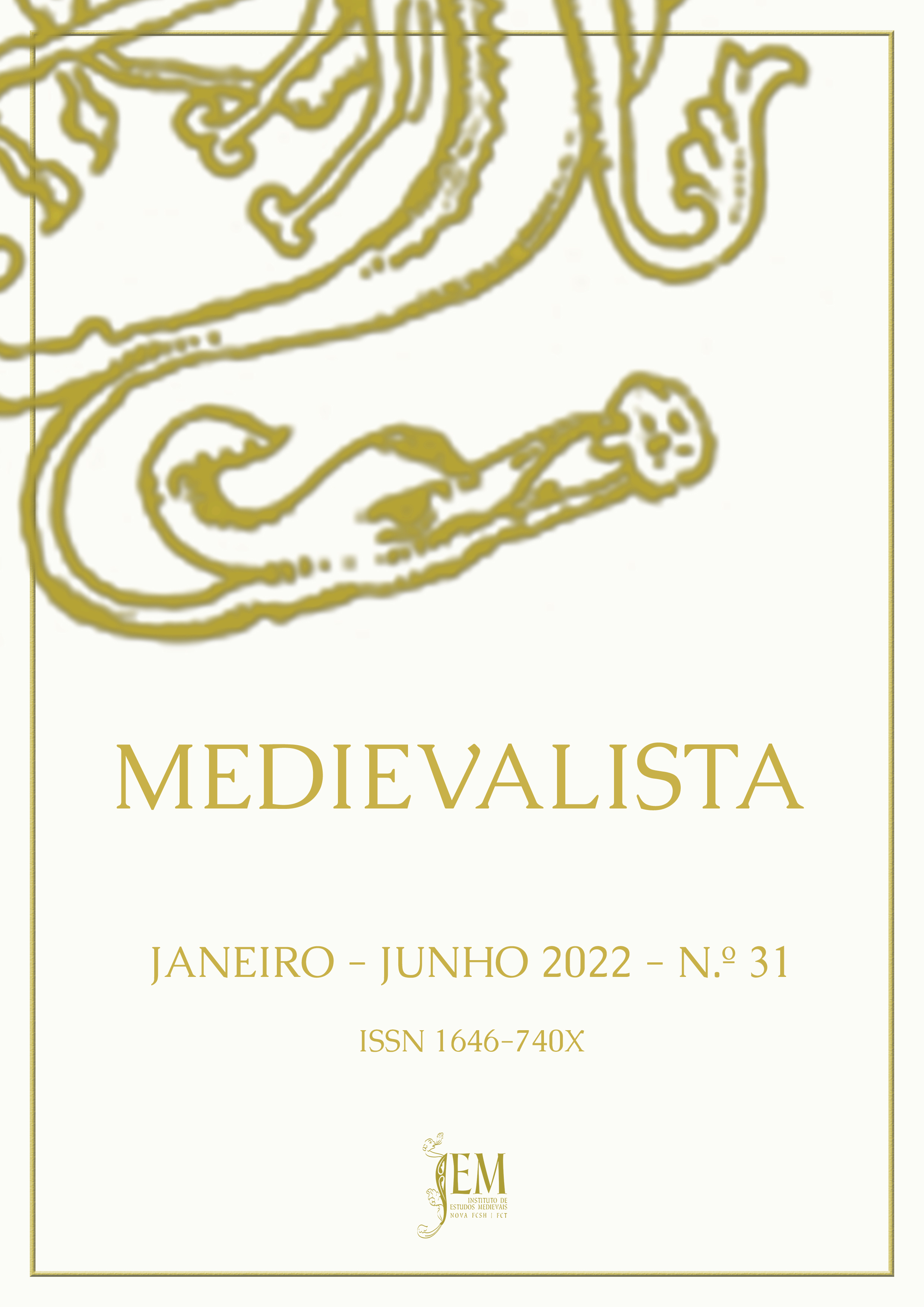God's nominations in the Proslogion argument: Identity between being and truth
DOI:
https://doi.org/10.4000/medievalista.5149Keywords:
Saint Anselm, Proslogion, De Veritate, identity, fides quaerens intellectumAbstract
Saint Anselm of Canterbury was a Benedictine monk who wrote the Proslogion argument in the 11th century. The nominations or names of God, are the different ways by which Saint Anselm explained the divine attributes. From a reinterpretation of Ricardo O. Díez’s study ¿Si hay Dios, quién es? an identity between the being and the truth of God is proposed, thus implying a mutual relationship between these attributes with the Anselmian definition of truth. The sentence fides quaerens intellectum will represent a methodology or model through which the thought is oriented in the rational clarification of these divine nominations. However, the same intellectual search will recognize a rational limitation against what it believes by faith. The nominations of the Proslogion and the definition of the truth of the De Veritate allow us to think of an identity that relates both works of Anselmian thought, identity that this article wanted to propose.
Bibliography
Primary sources
DESCARTES, René – Discurso del método. Madrid: Espasa Calpe, 2003.
DESCARTES, René – Meditaciones metafísicas. Madrid: Espasa Calpe, 2003.
EADMERO – “Vida de San Anselmo”. In SAN ANSELMO – Obras Completas. Vol. I. Madrid: BAC, 2008, pp. 5-73.
KANT, Immanuel – Crítica de la razón pura. Barcelona: Gredos, 2014.
SAN ANSELMO – “Acerca del gramático”. In SAN ANSELMO – Obras Completas. Vol. I. Madrid: BAC, 2008, pp. 441-443.
SAN ANSELMO – “Carta sobre la encarnación del Verbo”. In SAN ANSELMO – Obras Completas. Vol. I. Madrid: BAC, 2008, pp. 683-688.
SAN ANSELMO – “De Veritate”. In SAN ANSELMO – Obras Completas. Vol. I. Madrid: BAC, 2008, pp. 487-535.
SAN ANSELMO – “Fragmentos sobre filosofía del lenguaje. Sobre el poder y la impotencia, la posibilidad y la imposibilidad, la necesidad y la libertad.” In ANSELMO DE CANTERBURY – Fragmentos sobre filosofía del lenguaje. Bogotá: Ediciones Uniandes - CESO, 2001, pp. 159-211.
SAN ANSELMO – “Monologion”. In SAN ANSELMO – Obras Completas. Vol. I. Madrid: BAC, 2008, pp. 185-347.
SAN ANSELMO – Obras completas, 2 vols., texto latino de la edición crítica de F. S. Schmitt, introducción y traducción al español a cargo de J. Alameda, O. S. B., Madrid: BAC, 2008.
SAN ANSELMO – “Proslogion”. In SAN ANSELMO – Obras Completas. Vol. I. Madrid: BAC, 2008, pp. 353-441.
SAN ANSELMO – Proslogion. Con las réplicas de Gaunilón y Anselmo. Madrid: Tecnos, 2009.
SAN ANSELMO – “VI Suma teológica anselmiana sacada de las obras del santo doctor”. In SAN ANSELMO – Obras Completas. Vol. I. Madrid: BAC, 2008, pp. 155-172.
Studies
ÁLVAREZ, G. Mariano – “Sentido de la validez del argumento «ontológico» de San Anselmo”. In SAN ANSELMO – Proslogion. Con las réplicas de Gaunilón y Anselmo. Madrid: Tecnos, 2009, pp. 13-31.
ANTUÑANO, Alea – “San Agustín, arquitecto del pensamiento cristiano”. In SAN AGUSTÍN – Confesiones-Contra los académicos. Madrid: Gredos, 2012, pp. IX-LX.
CASTAÑEDA, Felipe – “Introducción a la filosofía del lenguaje en Anselmo de Canterbury”. In ANSELMO DE CANTERBURY – Fragmentos sobre filosofía del lenguaje. Bogotá: Ediciones Uniandes - CESO, 2001, pp. 13-152.
CORTI, Enrique – Oír, entender, argumentar. Lectura de Proslogion y De Grammatico de Anselmo de Canterbury. Buenos Aires: Miño y Dávila Editores, 2016.
GARCÍA DE LOMAS MIER, Josemaría – “El Intellectus Fidei en San Anselmo de Canterbury: claves hermenéuticas de las relaciones fe-razón en el método intelectual anselmiano”. Cuadernos de Filosofía, Excerpta e dissertationibus in philosophia 4 (1994), pp. 97-185.
GILSON, Étienne – La filosofía en la Edad Media. Madrid: Gredos, 2007.
GILSON, Étienne – El realismo metódico. Madrid: Rialp, 1974.
GONZÁLES, Angel – “La fascinación del argumento ontológico”. Revista de filosofía, Vol. VI, n. 9 (1993), pp. 201-206.
JOVEN ÁLVAREZ, Fernando – “Creer y entender en la carta 120 de San Agustín”. Scripta Fulgentina: revista de teología y humanidades, vol. XXII, nº 43-44 (2012), pp. 197-211.
JOLIVET, Jean – La filosofía medieval en occidente. México: Siglo XXI editores, 1985.
MARÍAS, Julián – San Anselmo y el insensato: y otros estudios de filosofía. Madrid: Revista de Occidente, 1994.
ÓSCAR DÍEZ, Ricardo – Anselmo de Aosta ayer, hoy y mañana. Buenos Aires: Academia Nacional de Ciencias de Buenos Aires, 2009.
ÓSCAR DÍEZ, Ricardo – “Características del pensamiento Medieval”. In Vita Flumen – 10 años en el pensamiento medieval. Buenos Aires: Academia Nacional de Ciencias de Buenos Aires, 2015.
ÓSCAR DÍEZ, Ricardo – “¿Si hay Dios, quién es?: una cuestión planteada por San Anselmo de Cantorbery en el Proslogion”. Cuadernos de anuario filosófico. Serie Universitaria 136 (2001), pp. 101-150.
PLANTINGA, Alvin – The ontological argument: from St. Anselm to Contemporary Philosophers. New York: A Doubleday Anchor Original, 1965.
PÉREZ DE LABORDA, Miguel – Anselmo de Canterbury Esencial. Mataró: Montesinos-Esencial, 2010.
REINA-VALERA – Biblegateway [En línea]. 1960. [Accedido en 23 March 2021]. Disponible en https://www.biblegateway.com/passage/?search=%C3%89xodo%203%3A14&version=RVR1960.
VELARDE, Julián – “Introducción”. In SAN ANSELMO – Obras Completas. Vol. I. Madrid: BAC, 2008, pp. 35-68.
VIGNAUX, Paul – El pensamiento en la Edad Media. México: Fondo de cultura Económica, 1983.
ZAÑARTU, Sergio – “Algunas notas sobre la búsqueda racional de Dios por Anselmo”. Anales de la Sociedad Chilena de Teología 3 (2003), pp. 125-143.

